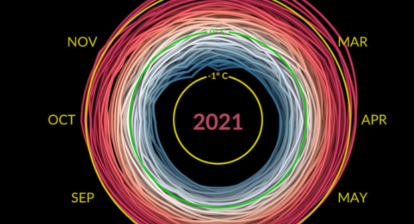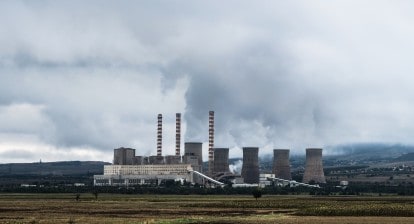The Intergovernmental Panel on Climate Change (IPCC) is the United Nations body for assessing the science related to climate change, established in 1988. Since 1990, it has published six reports on the on the physical science basis of climate change. The last Assessment Report (AR5) was published in 2013 and formed the basis for The Paris Agreement, a legally binding international treaty on climate change, adopted by 196 Parties at COP 21 in Paris, on 12 December 2015 and entered into force on 4 November 2016. The IPCC also published a special report in 2018-2019 highlighting the urgency of taking action on climate change.
Following that and prior to the UNFCCC Conference of the Parties (COP26) in Glasgow, scheduled to take place later in 2021, the IPCC has published its sixth Assessment Report (AR6) that incorporates new evidence from climate science. The report highlights “the current state of the climate, including how it is changing and the role of human influence, the state of knowledge about possible climate futures, climate information relevant to regions and sectors, and limiting human-induced climate change”.
While previous reports did warn that human activities were potentially causing Earth’s climate to change, the new study confirms that “It is unequivocal that human influence has warmed the atmosphere, ocean and land. Widespread and rapid changes in the atmosphere, ocean, cryosphere and biosphere have occurred.”
Unprecedented changes over many hundreds to even thousands of years have occured “across the whole climate system, as well as various aspects of climate change”. Climate change and a warming planet due to human activities is “already affecting many weather and climate extremes in every region across the globe”. There is now unequivocal evidence that extreme events such as heatwaves, heavy precipitation, droughts, and tropical cyclones are on the rise, and are in return impacting human populations across the planet.

Change in global surface temperature (annual average) as observed and simulated using human & natural and only natural factors (both 1850-2020) by APCC AR6.
Key Points of the Sith Assessment Report
- Global surface temperature has increased faster since 1970 than in any other 50-year period over at least the last 2000 years.
- Each of the last four decades has been successively warmer than any decade that preceded it since 1850, and the past five years have been the hottest on record since 1850.
- Global surface temperature was 1.09C higher in the decade between 2011-2020 than between 1850-1900.
- Human influence is very likely (90%) the main driver of the global retreat of glaciers since the 1990s and the decrease in Arctic sea ice area between 1979–1988 and 2010–2019. In 2011–2020, annual average Arctic sea ice area reached its lowest level since at least 1850.
- Global mean sea level increased by 0.20m between 1901 and 2018. The average rate of sea-level rise has tripled to 3.7 mm/year between 2006-2018, as compared to 1901 and 1971.
- Global mean sea level has risen faster since 1900 than over any preceding century in at least the last 3000 years
- In 2019, atmospheric CO2 concentrations were higher than at any time in at least 2 million years and concentrations of CH4 and N2O were higher than at any time in at least 800,000 years.
- It is virtually certain that hot extremes (including heatwaves) have become more frequent and more intense across most land regions since the 1950s, while cold extremes (including cold waves) have become less frequent and less severe.
- The frequency and intensity of heavy precipitation events have increased since the 1950s over most land area.
- It is likely that the global proportion of major (Category 3–5) tropical cyclone occurrence has increased over the last four decades.
Global Warming from 1880 to 2020
(Credit: NASA's Scientific Visualization Studio. Data provided by Robert B. Schmunk (NASA/GSFC GISS)
The report made it clear that some of the changes we have made to the climate system are irreversible over centuries or even millennia, especially changes in the ocean, ice sheets and global sea level.
It further predicts that global warming of between 1.5C and 2C will be exceeded in the 21 century, unless we make a concerted effort to reduce carbon dioxide and other green house gas emissions in the coming decades. “Continued global warming is projected to further intensify the global water cycle, including its variability, global monsoon precipitation and the severity of wet and dry events”, in addition to increases in extreme weather events such as the “frequency and intensity of hot extremes, marine heatwaves, and heavy precipitation, agricultural and ecological droughts in some regions, and proportion of intense tropical cyclones, as well as reductions in Arctic sea ice, snow cover and permafrost”.
Natural land and ocean carbon sinks are likely to become less effective with a higher carbon emission rate. Mean sea levels will continue to rise over the 21st century and “in the longer term sea-levels will continue to rise for centuries to millennia due to continuing deep ocean warming and ice sheet melt, and will remain elevated for thousands of years”.
We can already see the impacts of the changing climate systems on human populations across the globe, and with further warming more and more people are will be adversely impacted.
The Paris Agreement requires nations to limit temperature to under 2C with efforts to keep it under 1.5C this century. However, the sixth Assessment Report highlights that both these targets will remain unachieved (under all emission scenarios considered by the study), unless huge decreases in carbon emissions take place. Warming of 1.5C is likely to be reached by 2040 under all the sceniarios considered by the study scientists and if emissions are not drastically reduced, this is likely to occur even earlier. We have already reached temperatures 1.1C higher than pre-industrial levels (1850-1900).
The report does give a silver lining. The study scientists are hopeful that cutting emissions in half by 2030 and reaching net zero by 2050 will halt and even possibly reverse temperature rise. “Discernible differences in trends of global surface temperature would begin to emerge from natural variability within around 20 years, and over longer time periods for many other climatic impact-drivers”.
The stark warning in the report, so close to the global climate summit (COP26) in October, 2021, will perhaps encourage global leaders and politicians to step up efforts to reduce reliance on fossil fuels, invest in renewable energy and support the conservation of biodiversity and the environment.







